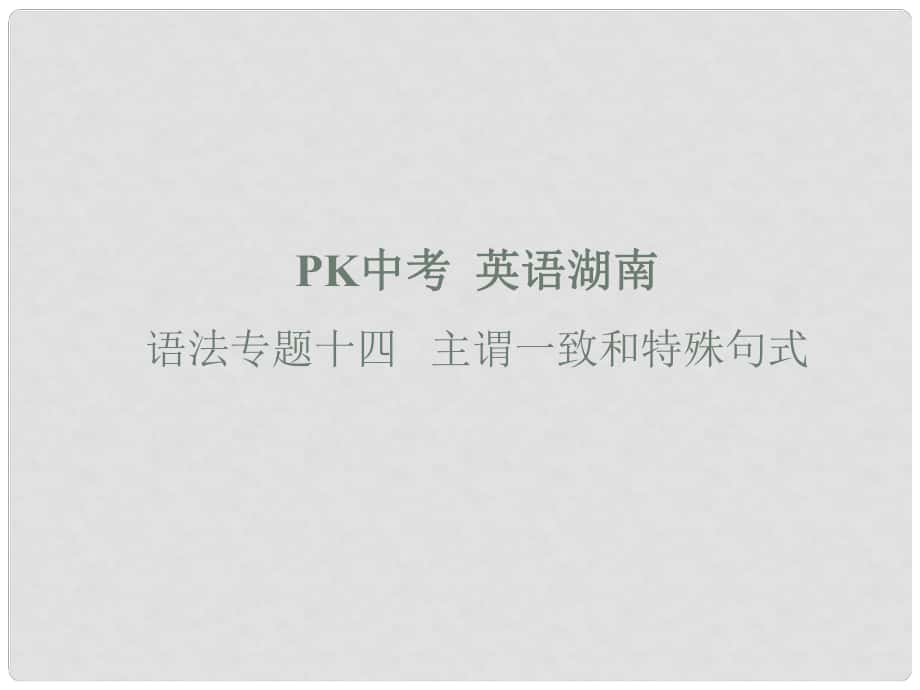《中考英語(yǔ)復(fù)習(xí) 語(yǔ)法專項(xiàng)突破篇 專題十四 主謂一致和特殊句式課件》由會(huì)員分享,可在線閱讀���,更多相關(guān)《中考英語(yǔ)復(fù)習(xí) 語(yǔ)法專項(xiàng)突破篇 專題十四 主謂一致和特殊句式課件(24頁(yè)珍藏版)》請(qǐng)?jiān)谘b配圖網(wǎng)上搜索����。
1��、PK中考中考 英語(yǔ)湖南英語(yǔ)湖南語(yǔ)法專題十四 主謂一致和特殊句式中考名題體驗(yàn)1.(2016年郴州)Look����!A woman with three children crossing the street. Lets help them. A. is B. are C. was 2.(2016年常德)Fifty yuan enough. A.is B. am C. are AA3.(2016年邵陽(yáng))One of my friends moved to America.I miss her so much.A.has B.have C.are4.(2016年永州)Neither Li Hua Nor
2�����、 I good at writing A.am B.is C.are 5.(2016年張家界)Playing computer games too much bad for students health. A.am B.is C.are 中考名題體驗(yàn)AAB語(yǔ)法探究語(yǔ)法探究一��、主謂一致 主謂一致是指謂語(yǔ)動(dòng)詞與主語(yǔ)在人稱和數(shù)上保持一致�����,主謂一致必須遵循三原則:語(yǔ)法一致原則���,意義一致原則�����,就近一致原則����。 (一)語(yǔ)法一致 即主語(yǔ)是單數(shù)形式,謂語(yǔ)動(dòng)詞用單數(shù)��;主語(yǔ)是復(fù)數(shù)形式���,謂語(yǔ)動(dòng)詞用復(fù)數(shù)�����。具體用法如下: 1.謂語(yǔ)動(dòng)詞用單數(shù)的情況 (1)單數(shù)名詞或代詞作主語(yǔ)時(shí): The young man is fro
3���、m Shandong.那位年輕人來(lái)自山東。 (2)動(dòng)詞不定式短語(yǔ)����、動(dòng)名詞短語(yǔ)或從句作主語(yǔ)時(shí): To err is human,to forgive is divine.人非圣賢�,孰能無(wú)過(guò)。 Seeing is believing.眼見(jiàn)為實(shí)���。 What hurts us the most teaches us the best . 傷害我們最深的對(duì)我們教育最深����。 (3)由each以及some, any, no, every 等構(gòu)成的復(fù)合不定代詞作主語(yǔ)時(shí);Nothing in the world can take the place of persistence.世界上沒(méi)有任何東西可以代替堅(jiān)持����。
4��、2.謂語(yǔ)動(dòng)詞用復(fù)數(shù)的情況(1)復(fù)數(shù)名詞或代詞作主語(yǔ)時(shí) They are brother.他們是兄弟�����。 Vegetables are good for your health.蔬菜對(duì)你身體有好處���。(2)由and 或bothand連接的并列成分作主語(yǔ)時(shí) Lucy and Lily are twins.露西和莉莉是雙胞胎���。 (3)以兩個(gè)部分組成的物體名詞如:scissors(剪子),glasses(眼鏡)��,shorts(短褲)����,trousers(褲子)作主語(yǔ)時(shí),謂語(yǔ)動(dòng)詞常用復(fù)數(shù)。如果其前帶有單位詞�����,則由單位詞的單����、復(fù)數(shù)形式?jīng)Q定動(dòng)詞的單復(fù)數(shù)形式。 Jims new trousers are black
5���、 and white.吉姆的褲子是黑白色的��。 One pair of scissors isnt enough.一把剪刀不夠����。 Two pairs of glasses are on the desk.桌上有兩副眼鏡�。 3.特殊情況 當(dāng)主語(yǔ)后面跟有由as well as,with,in addition to,along with, together with,except,besides, rather than,more than,no less than等引導(dǎo)的詞組時(shí),隨后的動(dòng)詞形式依前面的主語(yǔ)的單復(fù)數(shù)而定�。 Bill,together with his sister�,was hurt
6、in the accident.比爾和他的妹妹都在事故中受傷了���。 (二)意義一致 意義一致即是謂語(yǔ)的單復(fù)數(shù)形式起決于主語(yǔ)的單復(fù)數(shù)意義���,而非起決于主語(yǔ)的單復(fù)數(shù)形式��。 (1)集體名詞如class����,team��,family��,government�,public等當(dāng)整體看待時(shí),謂語(yǔ)動(dòng)詞用單數(shù)形式��;集體名詞當(dāng)組成集體的的各個(gè)成員看待時(shí)����,謂語(yǔ)動(dòng)詞用復(fù)數(shù)形式���。 Her family has moved to Beijing.她家搬到北京去了��。 Her family are watching TV now.她的家人正在看電視���。 (2)表示數(shù)目�����、時(shí)間��、金錢�����、距離的名詞作主語(yǔ)時(shí)�,謂語(yǔ)動(dòng)詞用單數(shù) One hundred
7���、 dollars is enough.100美元就夠了�。 (3)由and 連接的并列主語(yǔ)表同一概念時(shí)��,謂語(yǔ)動(dòng)詞用單數(shù)����;由and 連接的并列主語(yǔ)表不同概念時(shí),謂語(yǔ)動(dòng)詞用復(fù)數(shù)����。 The scientist and inventor is his father.那位科學(xué)家兼發(fā)明家是他父親。 The scientist and inventor are coming to our school.那位科學(xué)家和那位發(fā)明家都要到我們學(xué)校來(lái)�。 (4)“分?jǐn)?shù)(或百分?jǐn)?shù))of名詞”及“a lot of/lots of/plenty of/half of名詞”構(gòu)成的短語(yǔ)作主語(yǔ)時(shí)�����,其謂語(yǔ)動(dòng)詞形式要視of后面的名詞而定
8�����、�。Lots of food is going to waste.許多食物將要浪費(fèi)����。Lots of apples have been picked.許多蘋果都摘好了。Thirty-five percent of the doctors are women.醫(yī)生中有35%是女醫(yī)生��。 (三)就近一致就近原則即謂語(yǔ)動(dòng)詞的形式起決于最靠近它的名詞的單����、復(fù)數(shù)形式���。 1.由or���,nor,eitheror���,neithernor����,not onlybut also等連接的并列結(jié)構(gòu)作主語(yǔ)時(shí),隨后的動(dòng)詞形式遵循“就近原則” My sisters or my brother is likely to be at hom
9���、e.我的姐姐或是哥哥可能在家����。 Neither these nor that fits me.這些和那個(gè)都不適合我���。 2.由There be +并列主語(yǔ)作主語(yǔ)時(shí)�,由靠近be的主語(yǔ)決定���。 There is a pen and two books on the desk. 桌上有一支筆和兩本書����。二���、特殊句式 (一)強(qiáng)調(diào)句 1.強(qiáng)調(diào)句基本句型為“It is(was)+被強(qiáng)調(diào)部分+that(who)+其他”�����,此結(jié)構(gòu)強(qiáng)調(diào)的成分僅限于主語(yǔ)����,賓語(yǔ)和狀語(yǔ)。 It was my father who did the experiment in the lab yesterday evening昨晚在實(shí)驗(yàn)室做實(shí)驗(yàn)
10���、的是我父親���。 2. 強(qiáng)調(diào)句還有一種類型,就是用助動(dòng)詞do/did/does調(diào)謂語(yǔ)��。 She does like this horse. 她的確喜歡這匹馬(二)倒裝句 (1)“so+助動(dòng)詞be動(dòng)詞情態(tài)動(dòng)詞+主語(yǔ)”���,意為“某人(物)也是這樣”��,用來(lái)說(shuō)明上面說(shuō)的情況也同樣適用于后面所說(shuō)的人或物���。 Jim is smart,so is Carl.吉姆很聰明���,卡爾也是。(2)“neither+助動(dòng)詞be動(dòng)詞情態(tài)動(dòng)詞+主語(yǔ)”��,意為“某人(物)也同樣不”用于說(shuō)明上面說(shuō)的否定情況也同樣適用于后面所說(shuō)的人或物。 I didnt watch TV last night,neither did my father.
11���、我昨晚沒(méi)看電視���,我父親也沒(méi)有。 (3)以副詞here���,there����,out���,in�����,down��,away等方位副詞開(kāi)頭的句子���,如果主語(yǔ)是名詞,要用倒裝語(yǔ)序。如果主語(yǔ)是代詞��,則不需倒裝�。 There comes the bus.公共汽車來(lái)了。 Here are some flowers.這里有一些花�。專項(xiàng)集訓(xùn)專項(xiàng)集訓(xùn)一、用括號(hào)內(nèi)所給詞的適當(dāng)形式填空1.Every working elephant (have)its own keeper.2. Most of the drinking water _ (be) from the Black River.3. Not only she but also
12��、I _ (do) morning exercises every day.4. Either you or he _ (have) made a wrong decision.5. The family _(be) spending the weekend together.hasisdohasare6. The police _ (be) trying to catch the thief.7. The number of the teachers in the school _(be) 120.二 ����、語(yǔ)法填空1.Eating vegetables_ good for our health.
13、A. is B. are C. were 2. Something _ gone wrong with my TV set.A. has B. have C. is areisAA3.Nothing but grass and trees _ the hill.A. covers B. cover C. are covering4.The trousers_ to me.A. belong B. belongs C. is belonged 5. His family _always quarreling among _.A. is; itself B. are; themselvesC. i
14�����、s; themselves CAC6. There _ a desk, two beds and four chairs in the room. A. is B. are C. has 7. On the wall _ two large portraits(肖像). A. hangs B. hang C. hanged 8. It is what you do rather than what you say _ matters.A. that B. what C. which ABA9.You like football very much. _. A. So do I B. So I do C. I do too D. It is the same with meA
 中考英語(yǔ)復(fù)習(xí) 語(yǔ)法專項(xiàng)突破篇 專題十四 主謂一致和特殊句式課件
中考英語(yǔ)復(fù)習(xí) 語(yǔ)法專項(xiàng)突破篇 專題十四 主謂一致和特殊句式課件

